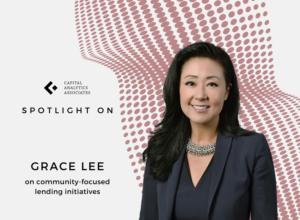 3 min read September 2023 — In an interview with Invest:, Grace Lee, regional president, Massachusetts of M&T Bank, talked about the impact of the recent acquisition and merger of People’s United Bank. The bank actively supports small businesses through community-focused lending initiatives and as an SBA lender.
3 min read September 2023 — In an interview with Invest:, Grace Lee, regional president, Massachusetts of M&T Bank, talked about the impact of the recent acquisition and merger of People’s United Bank. The bank actively supports small businesses through community-focused lending initiatives and as an SBA lender.
What have been some recent highlights or milestones for the bank?
The biggest highlight is M&T Bank’s acquisition and merger of People’s United Bank which was completed earlier this year. The benefit of this acquisition was that it allowed M&T to extend its footprint deeper into New England, including Boston. Luckily, there was not much redundancy, so the immediate priority was making sure that we maintained our momentum with our customers. It’s special because it makes us a bigger and bolder team. Both organizations have a community-focused business model, so we’ve been able to quickly align as a team.
What are some of the strengths of the region that make it a great opportunity?
Massachusetts is truly a unique state, and one of its richest resources is its intellectual capital. You not only have the best in class nationally but globally when it comes to companies and workforces across sectors, including education, science, and healthcare, to name a few. There is an incredible ecosystem that punches way above its weight. The world saw that with locally-based Moderna’s response to the pandemic to quickly expedite a vaccine, and we continue to see an expansion in the reach and impact of Boston’s collective brain trust.
What support do you provide to small businesses?
M&T has a rich history in lending. It goes back to our core values as a community bank. But setting that aside and looking at the statistics: 80% of all new businesses are started by immigrants, so it’s critical that we not only target these communities but truly understand them and their needs as customers and business owners. We have been able to amplify and execute our ability to reach this demographic on a community banking level and perfect it for the New England market. Our SBA lending skills have been profoundly empowering. You’ll often hear “America Runs on Dunkin” here, but the truth, as pointed out by Shirley Leung of The Boston Globe, is that America runs on immigrants or, rather, businesses started by immigrants.
How has the bank been navigating economic challenges?
From a bank perspective, especially one that is 166 years old, we are community-focused and run a very conservative business. Dealing with unprecedented increases in interest rates at a speed we haven’t witnessed in the recent past has been challenging but also an opportunity because, during turbulent times, people lean on those who have established trust. During the pandemic, we hunkered down and took extra care to ensure we were there for customers. It takes a little bit more time and thoughtful, intentional planning, but, in the end, it is still the same model. We are answering the phone as many times as needed and really taking a localized and personal approach.
What DEI initiatives does the bank have in place?
My background is in civil rights, starting as an assistant district attorney and then working at the Office for Civil Rights under the U.S. Department of Education. Regardless of the venue you are in, you have the power to correct historical inequities, and the platform to make a dent — diminishing the wealth gap that has been pervasive throughout history, for example. People look at finance and social justice as being in separate buckets, but they are intertwined. While people view finances as cold and transactional, people move and react based on capital. It is how you provide for your family and put a roof over your head. Unfortunately, how to manage finances is not universally taught throughout our academic institutions. I’ve seen incredibly accomplished professionals — attorneys and doctors — who manage their money incredibly poorly. Teaching somebody how to get a paycheck is one thing, but saving and growing your money is another skill set. Gaining and passing on that knowledge is critical to building generational wealth for families and communities. A sustainable future requires a more thoughtful and methodological approach to move from surviving to thriving.
What is your outlook and what are your top priorities for the bank?
While external pressures are certainly weighing on the global economy, the outlook for M&T, especially in Massachusetts, is very strong. Our focus on communities, customers, and colleagues is something that the market is familiar with and can embrace. Among my priorities is to continue to be a superlative community bank and continue to build long-term relationships that unearth more opportunities for sustainable growth.
For more information, please visit:
